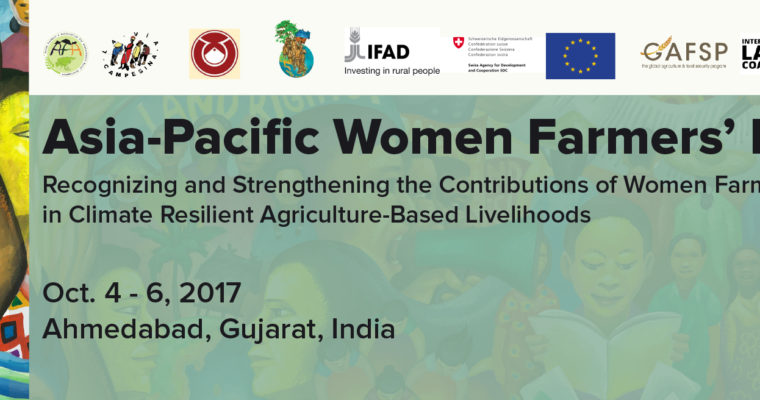Around 90 women farmers and representatives of rural women from 14 countries in South Asia, Southeast Asia, and the Pacific regions came up with a declaration at the end of the three-day Asia-Pacific Women Farmers Forum (APWFF) held in Ahmedabad, Gujarat, India on 4-6 October 2017.
Aimed to make appreciation for women farmers in addressing food security, nutrition and climate change in general, and to identify key action points to strengthen these role of women, the forum gave space for women farmers to share their work, gave analysis, insights and perspectives and outlined ways forward.
During the forum, the participants discussed the initiatives they have done and actions they have taken to reduce poverty and hunger in their families and communities, as well as the challenges and obstacles they face as they perform their roles in society development, and the strategies and actions they want to implement to fully achieve women’s potentials as key stakeholders in sustainable development. The participants also identified ways forward to sustain or replicate their efforts.
Asian Farmers Association for Sustainable Rural Development (AFA) Secretary General Esther Penunia stressed that the importance of conducting the forum is highlighted into two (2) concerns: first is that Asia-Pacific region has the most number of small-scale family farmers in the world at 70%. She noted that it is the small scale family farmers that feed the world. And second, women in family farmers do as much as 70-90% of the work but are not recognized, are underpaid, and underprivileged.
In her opening remarks, AFA Vice-Chair Shazada Begum recounted the plight of women farmers in her country, Bangladesh, saying that women farmers in her country are not recognized. She expressed hope that the forum will be a venue to discuss the future of women farmers and that the participants can come up with consolidated issues and challenges and provide ways on how to overcome these.
Meera Mishra of the International Fund for Agricultural Development (IFAD) stressed that the forum is a very important platform not only for sharing experiences of the farmers, but to also to talk about new innovations. “All women farmers should also be encouraged to learn basic technology and be open to technologies. Only then can you be open to new opportunities,” she says.
Self Employed Women’s Association (SEWA) Executive Director Reema Nanavaty also said that the meeting could also be for finding ways on how to create more opportunities for women. Furthermore, she expressed hope that the result of the deliberations will make a big way for policies of India and will be brought to International Labour Organization (ILO) in 2019 to be included in the discussion on the future of women and young farmers in Asia. “We will all work together to improve the lives of women farmers and their families and give integrity to the farming profession by doing the work that we do,” she added.
The participants of Asia-Pacific Women Farmers’ Forum visited a salt farming village in Surendranagar.
At the end of the three-day forum, the women farmers showed their strong conviction and commitment to reducing hunger and poverty and to sustainable development by stating a declaration containing small but sure steps that they can do to make this plan come true.
In the declaration, the women farmers asked the governments to provide an enabling and favorable environment to strengthen women’s contributions to sustainable development by:
- ensuring women’s rights to lands, waters, forests and seeds;
- providing incentives and support for integrated, diversified organic farming and promotion of home gardens and climate resilient agriculture;
- providing incentives and support for cooperatives and enterprises that are managed and owned by women farmers such as loans, credit at subsidized rates;
- ensuring that global trade policies and agreements do not undermine the livelihoods of women farmers;
- ensuring the meaningful involvement of women farmers in agriculture;
- providing IT-related support so they can get information on market, weather, technologies and other programs;
- recognizing women farmers through identity cards; and,
- providing the necessary social and physical infrastructures (e.g. roads, bridges, market buildings, storage facilities, health centers, training facilities, land for demonstration farms, etc.).
They also asked development partners to provide support by:
- dedicating and allocating a reasonable amount for farmer’s organizations (e.g. revolving fund, grants, concessional loans, etc.);
- building our leadership and management capacities to run our own women’s spaces and /or lead alongside with our male counterparts in farmers’ organizations;
- strengthening solidarity and knowledge sharing and capturing lessons learned from our initiatives through various exchange visits, study tours, and production and dissemination of knowledge materials and use of social media;
- supporting the formation and strengthening of women’s involvement in enterprises and farmers’ cooperatives that add value to our priority products;
- providing project guidelines that underline affirmative action for women in project design, implementation, monitoring and evaluation; and,
- providing farmer-friendly project reporting formats.
The Asia-Pacific Women Farmers’ Forum was organized by AFA, La Via Campesina and SEWA, with support from MTCP2 Programme and development partners IFAD, Swiss Agency for Development and Cooperation (SDC), European Union (EU), Global Agriculture and Food Security Program (GAFSP), International Land Coalition (ILC) and World Rural Forum (WRF).




Comments are closed